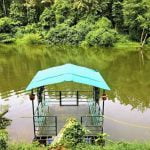
Participants of the workshop on ULB election vis-à-vis Article 371A held at Capital Convention Center, Kohima on May 20.
The Ex-Parliamentarians Association of Nagaland (PAN) today held a workshop on the ULB election vis-à-vis Article 371A at Capital Convention Center, Kohima.
The resource persons for the workshop were Justice HK Sema, Supreme Court Judge (Retd) and Justice Zelre Angami, High Court Judge (Retd), while the Chief Guest for the workshop was Dr. Shürhozelie Liezietsu, Nagaland Chief Minister.
The Nagaland CM said that the State Government had declared its intention to amend the Nagaland Municipal Act, or to enact an altogether new Municipal Act in consultation with all stakeholders, and to hold ULB election only after that.
The CM clarified that the main interest and intention of the State Government in deciding to go ahead with the ULB elections with women reservation was the desire to protect Article 371-A of the Constitution.
“It is very necessary that proper dialogue and discussions are held on this sensitive issue, so that we do not commit mistakes which we may regret later,” he said and hoped that with the collective wisdom and experience of past and present parliamentarians of Nagaland, and with the presence of constitutional and legal experts, the workshop will throw some light on this contentious issue. He expressed optimism that the workshop would also set the course for further consultations with other vital stakeholders in the State.
Chairing the occasion, Medokul Sophie, General Secretary, Ex-PAN stated that the conflict on the ULB arose due to the lack of communication between the people and the State Legislature. He said that the PAN hence felt it necessary as leaders of the people to come out clear on this.
Justice HK Sema meanwhile appealed the leaders to go back to the grassroots, listen to the people and also make them aware of the prospects of the ULB. Despite being a small people, Nagas today suffer mostly due to divisions and especially the idea of ‘Ism,’ which Justice Sema termed as the biggest enemy of Naga society.
The ULB was an unnecessary burning issue, viewed Justice Sema. He meanwhile pointed out that there is a lack of awareness on the Judiciary and the Constitution in Naga society. The concepts being new ideas for the Nagas, Justice Sema also attributed the issue to the lack of communication between the representatives and the people.
“Nagas think that because of the application of Article 371A, other provisions are not applicable in the State, which will produce perilous results. There will be constitutional breakdown,” claimed Sema.
He reminded that Nagaland State is a creation of the Constitution of India and that any democratic State is governed by the rule of law, and therefore the liberty and freedom of the citizens are under the law.
Article 371A
On Article 371 A, Justice Zelre Angami called for a considered interpretation regarding application of the Article to ensure that it does not become a hurdle to the progress of the State.
“There is a temptation to block the application of social welfare and development legislations on the ground of Article 371A and as such a duty is cast on the law makers to judiciously use the procedure laid down in the Article,” he said.
He further stated that Article 371 A would not have the effect of validating all customary laws, but only speaks of procedure to be adopted. “The same provision speaks of the procedure to be adopted for the application of central laws on the matters mentioned. The customary laws would have to be tested by the provisions of the Constitution.
Custom as such is also a question of fact and as such the same is required to be judicially declared as having the force of law.”
Although the Article highlights the unique Constitutional history of the State of Nagaland, Justice Angami appealed for “a careful thinking” of the Article as a matter of legal concept, as “Law is an instrument for change for the better and therefore the concept of the existing law should have attention of the law makers.”
Justice Sema meanwhile viewed that the article has been misused, misunderstood and misinterpreted because of the lack of education and lack communication between the public and the executive, legislatures and lawmaking authority.
ULB and women
reservation
Regarding women reservation and ULBs, Justice Angami stated that ULBs are beyond the control of village administration or local bodies in rural areas, where the customary practice and usages have no relation with the functions of ULBs.
“Therefore, a view may be taken that it may not be legally sound to resist the statutory provisions of making reservation of women in the composition of ULBs. The process of urbanization would continue to pick up and as such ULBs have to be strengthened,” he stated. He added that in order to provide efficient municipal service, the ULB must have access to its own sources of revenues.
“In a traditional bound orthodox male dominated society, can we say men and women are equal? No. Women Reservation is simply creating a leveling field,” asserted Justice Sema, adding that the ULB is for progress and to provide better facilities to the urban areas, and therefore Municipal tax is required to provide convenient facilities for each citizen.
“Our state is very old but our knowledge of the law is still very young,” he lamented and suggested that the government set up a State Law Commission headed by a Retired Judge.
JCC/NTAC urges govt to revoke ULB resolution
DIMAPUR, MAY 20 (MExN): The Joint Coordination Committee (JCC) and the Nagaland Tribes Action Committee (NTAC) today reiterated its appeal to the Nagaland State Government to revoke the resolution dated November 24, 2016 regarding holding of Urban Local Bodies (ULB) election with 33% reservation for women. A press note from the JCC informed that it had made the same appeal earlier to be discussed in the previously held Nagaland Legislative Assembly (NLA) session. It however lamented that the matter was not taken up “despite being a serious issue confronting the aspiration and wishes of the people of Nagaland.” It therefore asked the state government to take up the matter on priority basis in the forthcoming assembly session and revoke the said cabinet resolution “as the same is against the wishes and interest of the people of Nagaland.”
[“Source-ndtv”]










